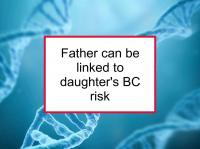Not surprisingly, women whose fathers have been diagnosed with breast cancer or whose fathers are BRCA mutation carriers are at higher risk of breast cancer than the general population. What perhaps is surprising is that such women have higher risk of breast cancer than the daughters of mothers with breast cancer or BRCA mutations.
In addition, daughters of fathers with breast cancer/BRCA tend to develop breast cancer at a younger age than daughters of mothers with breast cancer/BRCA. This pattern has implications for breast cancer screening and surgical risk reduction in daughters of such parents.
Timing of non-BRCA inherited breast cancer
Women having a mother or sister with breast cancer are diagnosed and die at earlier ages than women without a family history. A Swedish study reported that the level of risk of breast cancer at the age of 50 of women lacking a family history was reached by women with a mother with breast cancer between 12.3 years (mother affected at age less than 40) and 3.3 years (mother affected at age at least 82) earlier.
In other words, daughters of mothers who were diagnosed when relatively young tend themselves to be diagnosed at an even younger age.
Timing of BRCA mutation-related inherited breast cancer
Compared to the age of diagnosis in the first BRCA mutation carrier generation, the expected age of cancer onset is estimated to be 7.9 years younger in the next generation, according to a U.S. study. Like non-BRCA familial breast cancer, breast and ovarian cancers in BRCA mutation carriers appear to be diagnosed at an earlier age in later generations.
Women with BRCA mutations inherited from their fathers tend to develop breast cancer at younger age than women who inherit BRCA mutations from their mothers, according to the new study listed above. The average age of diagnosis was 43 years for breast cancer and 51 for ovarian cancer. For breast cancer patients who inherited BRCA1 mutations from their mothers, the average age was 45.73 compared to 38.04 for women who inherited BRCA1 mutations from their fathers. For breast cancer patients who inherited BRCA2 mutations from their mothers, the average age was 50.65 compared to 41.68 for women who inherited BRCA2 mutations from their fathers. In other words, women with paternally inherited BRCA mutations develop breast cancer at younger age compared to women who inherit the gene mutations from their mothers. On the other hand, no significant difference was found between paternal and maternal age of ovarian cancer diagnosis of BRCA mutation carriers.
Implications for those with familial breast cancer
Taken together, available study results provide possible guidelines for young women with BRCA mutations and/or a strong family history of breast cancer. Such high-risk women typically are advised to begin annual screening for breast cancer at age 25. This guideline makes sense in that it is likely to provide cancer-free baseline images to which subsequent imaging results can be compared. Of course, high-risk women with symptoms of breast cancer should be screened as soon as any symptoms are detected (although very rare, even teenagers can develop breast cancer).
High risk women who wish to start families or harvest eggs for future use should attempt to do so, if possible, several years before a diagnosis of breast cancer becomes increasingly more likely. This would also set the stage for prophylactic mastectomy and/or oophorectomy for those who choose to reduce their risk of breast cancer in this way.
Those whose mothers develop breast cancer in their thirties appear to be at risk of being diagnosed with breast cancer as much as 12 years earlier. For example, if a mother was 37 at diagnosis, her daughter's risk might increase sharply starting at age 25. Those whose mothers were in their forties at diagnosis appear to be at heightened risk of being diagnosed starting 10 years earlier. Those whose mothers were in their fifties at diagnosis appear to be at heightened risk of being diagnosed starting eight years earlier.
Women with BRCA mutations without a first degree relative (parent, sibling or child) with breast cancer can be guided by the average ages in the section above on the timing of BRCA mutation-related breast cancer. Obviously, these are not hard and fast numbers, just an attempt to provide some guidelines using the limited available data. Note that a large minority of even the highest risk women never develop breast cancer.
Please see our articles on BRCA mutation carriers and protecting our daughters from breast cancer for more information.
